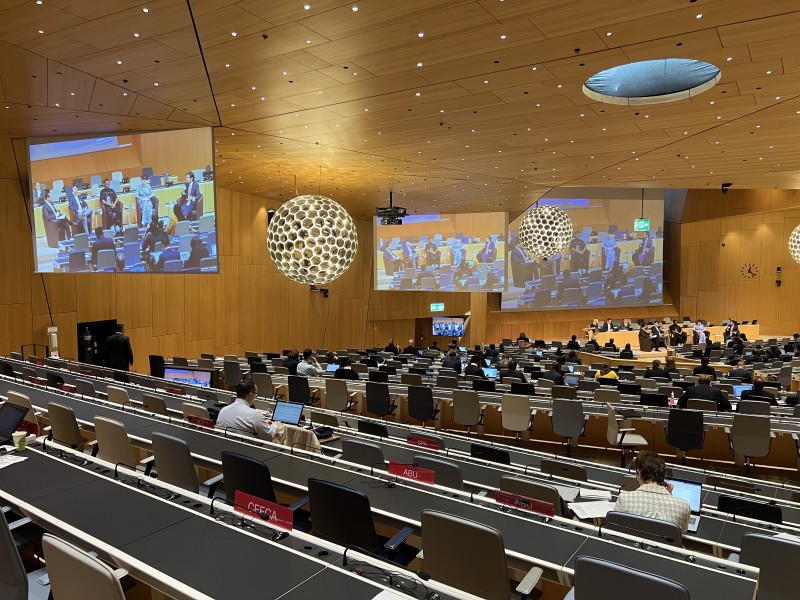An information session on the impact of COVID on the copyright ecosystem, election of a new officers and approval of observers were the headline discussion points for the day but the Russian invasion of Ukraine cast a shadow over the morning’s proceedings.
The conference hall was well attended with delegations and observers also joining remotely. You can follow the week’s meetings here. The 42nd Standing Committee began without an official chair (more below on that). The WIPO secretariat, through Michelle Woods, assumed the role of Chair to keep things moving. Deputy Director General, Sylvie Forbin, welcomed the delegates enthusiastically.
The Russian invasion of Ukraine then dominated the morning’s proceedings with the delegation of the Russian Federation taking the floor to mark Victory Day (celebrating the victory of the Allies in 1945) followed by a remote intervention by the Ukrainian delegation recognizing the importance of the work of WIPO but denouncing the Russian invasion of Ukraine. The Ukrainian delegation was supported by a number of groups and individual delegations, who linked the inability of Ukraine’s creative industries to operate during the current war. The Russian Federation Delegation took the floor to call for WIPO’s work to remain non-political, using its right to reply to justify the invasion of Ukraine, which prompted delegates and observers to leave the chamber en masse.
Following a short break, delegates returned to the chamber for an information session, not formally part of the SCCR agenda, on the impact of COVID on the copyright ecosystem. The information session was split into two sections, the first focusing on the creative industries, and the second focusing on ‘Educational, Research and Cultural Heritage Institutions and the People They Serve’.
The session opened with the presentation of a new report: The impact of the COVID-19 pandemic on creative industries, cultural institutions, education and research
Indian Publisher and IPA Executive Committee member, Pranav Gupta, joined the first session to discuss the impact of the pandemic on publishers in India. He underlined the difficulty for small and medium sized publishers to match the required speed of digital developments and highlighted how Indian publishers were quick to offer free or reduced rate educational resources to institutions and the public. He also shared his own experience of digital piracy, receiving a Telegram message offering him a dump of 500 books for just US$10, and demonstrating how platforms need to be able to be held accountable.
You can watch the session online here: https://c.connectedviews.com/05/SitePlayer/wipo?session=115325
The WIPO report wasn’t the only report released on this first day of SCCR. IFLA, the International Federation of Library Associations and Institutions, and EIFL, Electronic Information for Libraries, released their own on How well did copyright laws serve libraries during COVID-19? (spoiler: libraries complain about copyright).
The Information Session closed and the SCCR resumed with behind-the-scenes discussions leading to agreement on the officers for the coming period:
- Abdoul Aziz Dieng (Senegal) became Chair until the first meeting of 2023, then becoming Vice Chair until the first meeting of 2024;
- Owen Ripley (Canada) was elected Vice Chair until first meeting of 2023 when he will assume the SCCR Chair until the first meeting of 2024;
- Peter Labody (Hungary) was elected SCCR Vice Chair, until the first meeting of 2024.
Mr Dieng thanked the SCCR in his measured tones for their confidence in him to chair the Committee.
Officers duly elected, the Committee proceeded with Committee business and approved 7 of the 13 applications for observer status. There was however no consensus over the approval of the 6 national Wikimedia associations, with Chinese delegation expressing its opposition and a number of other delegations reminding the Committee of the need for consensus.
The last item of the day was the adoption of the report of the last SCCR. This will be the last time that such a written report will constitute the recording of an SCCR meeting with the video recording and transcript to be the future report of reference. With the clock inching closer to 6pm, Mr Dieng brought the day’s proceedings to a close.
Tomorrow, the main subject of conversation will be the Broadcasting Treaty (again!).

